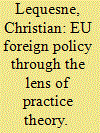| Srl | Item |
| 1 |
ID:
145284


|
|
|
|
|
| Summary/Abstract |
The reform of the eurozone and the concerns surrounding a potential ‘Brexit’ has given rise to a new debate about differentiation but also disintegration in the European Union. This article provides a theoretical and analytical approach to understanding how differentiation is related to the debate on distribution of competences across various levels government. It finds that differentiation has played an important role in the EU integration process since the 1950s, even though the risk of fragmentation has always existed. Facing the benefits and costs of differentiation, the member states have developed their own practices. Three ideosyncratic groups of member states can be identified in this regard: first, a group of Anglo-Scandinavian member states which refuse centralization of the EU; a Franco-German group which considers the integration through the promotion of a ‘core Europe’; and, third, a group of central and east European member states who fear that differentiation would set their interests aside and relegate them to second-class status within the EU. Finally, Brexit is not only about the status of the UK in the EU, but casts deeper questions on how to clarify the nature of relations between the eurozone and the EU as a whole.
|
|
|
|
|
|
|
|
|
|
|
|
|
|
|
|
| 2 |
ID:
141724


|
|
|
|
|
| Summary/Abstract |
There is a proliferation of works on the new European External Action Service (EEAS). Most of these approach the EEAS through a rationalist framework, assessing how a new institution can solve long-term questions of EU foreign policy-making to ensure consistency and coherence while reducing transaction costs between actors (both supranational and national) in a multilevel governance structure. This paper takes a different direction. Using 30 interviews with officials from the EEAS, the European Commission, and national ministries of foreign affairs, conducted between 2010 and 2013, it shows how the study of practice aids understanding of the nature of the EEAS. As a new institution, the EEAS lends itself particularly well to practice-based study because new institutions must develop new practices.
The first section of the article defines the notion of practice and shows the importance of historicizing the struggles around practices in understanding the creation of the EEAS. The second section demonstrates how agents’ practices shape professional cultures within the EEAS. The third section highlights the relationship between practices and rule-making. Going over the EEAS as a case study, the conclusion focuses on the importance of analysing actors’ practices for understanding the current evolution of diplomacy and international relations in general.
|
|
|
|
|
|
|
|
|
|
|
|
|
|
|
|
| 3 |
ID:
146816


|
|
|
|
|
| Contents |
The Paris terrorist attacks in January and November 2015 have changed the relationship between French society and security. For the first time since the end of the Second World War, the assumption that France is experiencing a new form of territorial war is explicit in the public debate. It has reinforced the strong conviction among the French politicians and diplomats that security requires close cooperation with the USA and a renouncement of the Gaullist paradigm of exceptionalism. This paper analyses why the terrorist attacks have been perceived in France as a form of territorial war. Second, it explains why terrorism contributes to a growing mistrust of the French public vis-à-vis the European Union. Finally, it shows the reasons but also the limits of French military activism outside Europe, in close connection with the US-led strategy.
|
|
|
|
|
|
|
|
|
|
|
|
|
|
|
|
| 4 |
ID:
170929


|
|
|
|
|
| Summary/Abstract |
It is quite understandable that diplomatic studies devote a huge amount of research to new trends in diplomacy such as public diplomacy, cyber-diplomacy, and digital diplomacy. Research has therefore become more limited when states’ foreign services and institutions are concerned. This contribution is a plea for not forgetting research perspectives on foreign ministries in the world. It insists on five good reasons to continue comparative work on what seems to be a ‘classic’ topic of diplomatic studies. The article is conceived as the introduction to a series of other contributions on the subject, all resulting from a round-table that took place at the ISA Congress 2017 in Baltimore.
|
|
|
|
|
|
|
|
|
|
|
|
|
|
|
|